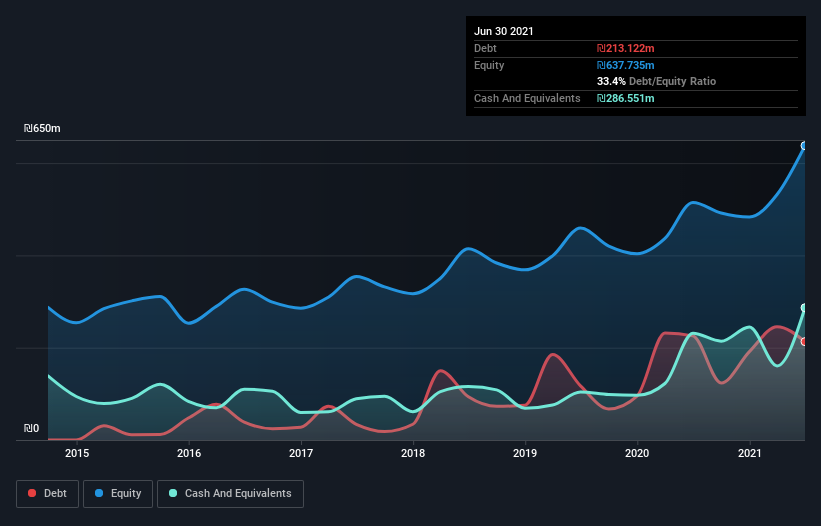Legendary fund manager Li Lu (who Charlie Munger backed) once said, 'The biggest investment risk is not the volatility of prices, but whether you will suffer a permanent loss of capital.' So it might be obvious that you need to consider debt, when you think about how risky any given stock is, because too much debt can sink a company. We can see that Maytronics Ltd. (TLV:MTRN) does use debt in its business. But should shareholders be worried about its use of debt?
What Risk Does Debt Bring?
Debt assists a business until the business has trouble paying it off, either with new capital or with free cash flow. Ultimately, if the company can't fulfill its legal obligations to repay debt, shareholders could walk away with nothing. However, a more usual (but still expensive) situation is where a company must dilute shareholders at a cheap share price simply to get debt under control. Having said that, the most common situation is where a company manages its debt reasonably well - and to its own advantage. When we think about a company's use of debt, we first look at cash and debt together.
See our latest analysis for Maytronics
How Much Debt Does Maytronics Carry?
You can click the graphic below for the historical numbers, but it shows that Maytronics had ₪213.1m of debt in June 2021, down from ₪225.7m, one year before. But on the other hand it also has ₪286.6m in cash, leading to a ₪73.4m net cash position.

How Healthy Is Maytronics' Balance Sheet?
We can see from the most recent balance sheet that Maytronics had liabilities of ₪528.6m falling due within a year, and liabilities of ₪170.8m due beyond that. Offsetting this, it had ₪286.6m in cash and ₪366.8m in receivables that were due within 12 months. So it has liabilities totalling ₪46.1m more than its cash and near-term receivables, combined.
Having regard to Maytronics' size, it seems that its liquid assets are well balanced with its total liabilities. So it's very unlikely that the ₪8.10b company is short on cash, but still worth keeping an eye on the balance sheet. Despite its noteworthy liabilities, Maytronics boasts net cash, so it's fair to say it does not have a heavy debt load!
In addition to that, we're happy to report that Maytronics has boosted its EBIT by 62%, thus reducing the spectre of future debt repayments. When analysing debt levels, the balance sheet is the obvious place to start. But it is Maytronics's earnings that will influence how the balance sheet holds up in the future. So when considering debt, it's definitely worth looking at the earnings trend. Click here for an interactive snapshot.
Finally, a company can only pay off debt with cold hard cash, not accounting profits. Maytronics may have net cash on the balance sheet, but it is still interesting to look at how well the business converts its earnings before interest and tax (EBIT) to free cash flow, because that will influence both its need for, and its capacity to manage debt. Over the most recent three years, Maytronics recorded free cash flow worth 62% of its EBIT, which is around normal, given free cash flow excludes interest and tax. This cold hard cash means it can reduce its debt when it wants to.
Summing up
While it is always sensible to look at a company's total liabilities, it is very reassuring that Maytronics has ₪73.4m in net cash. And it impressed us with its EBIT growth of 62% over the last year. So is Maytronics's debt a risk? It doesn't seem so to us. Above most other metrics, we think its important to track how fast earnings per share is growing, if at all. If you've also come to that realization, you're in luck, because today you can view this interactive graph of Maytronics's earnings per share history for free.
At the end of the day, it's often better to focus on companies that are free from net debt. You can access our special list of such companies (all with a track record of profit growth). It's free.
If you’re looking to trade a wide range of investments, open an account with the lowest-cost* platform trusted by professionals, Interactive Brokers. Their clients from over 200 countries and territories trade stocks, options, futures, forex, bonds and funds worldwide from a single integrated account. Promoted
New: Manage All Your Stock Portfolios in One Place
We've created the ultimate portfolio companion for stock investors, and it's free.
• Connect an unlimited number of Portfolios and see your total in one currency
• Be alerted to new Warning Signs or Risks via email or mobile
• Track the Fair Value of your stocks
This article by Simply Wall St is general in nature. We provide commentary based on historical data and analyst forecasts only using an unbiased methodology and our articles are not intended to be financial advice. It does not constitute a recommendation to buy or sell any stock, and does not take account of your objectives, or your financial situation. We aim to bring you long-term focused analysis driven by fundamental data. Note that our analysis may not factor in the latest price-sensitive company announcements or qualitative material. Simply Wall St has no position in any stocks mentioned.
*Interactive Brokers Rated Lowest Cost Broker by StockBrokers.com Annual Online Review 2020
Have feedback on this article? Concerned about the content? Get in touch with us directly. Alternatively, email editorial-team (at) simplywallst.com.
About TASE:MTRN
Maytronics
Engages in the development, production, marketing, distribution, and technical support of swimming pool equipment in Israel, North America, Europe, Oceania, and internationally.
Average dividend payer with slight risk.
Similar Companies
Market Insights
Community Narratives




